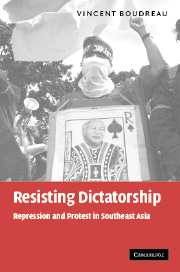
-
Select format
-
- Publisher:
- Cambridge University Press
- Publication date:
- December 2009
- November 2004
- ISBN:
- 9780511550867
- 9780521839891
- 9780521109611
- Dimensions:
- (228 x 152 mm)
- Weight & Pages:
- 0.62kg, 308 Pages
- Dimensions:
- (229 x 152 mm)
- Weight & Pages:
- 0.45kg, 308 Pages
You may already have access via personal or institutional login
Book description
Vincent Boudreau's book compares state repression in three post-war dictatorships under Burma's Ne Win, Indonesia's Suharto and the Philippines' Ferdinand Marcos. In each case the dictator faced distinct social challenges and responded with specifically tailored repressive strategies. These strategies shaped the resources, social bases and opposition cultures available to dissidents and in turn influenced the effectiveness of that opposition. The author balances his first-hand research in the countries in question with the social movements literature to consider the long-term interactions between the regimes and their societies in the wake of repression, and the emergence of the democracy movements which followed. This is a thought-provoking book, which offers a truly comparative study on dictatorship, resistance and democracy in South East Asia. As such, it will be invaluable to students, as well as to those involved in policy making and commentating on the region.
Reviews
"Quite often, it seems, a great idea is obvious -- but only after it is introduced by an innovative thinker. That the outcome of repression and resistance is conditioned by the case-specific context of the struggle and that therefore it is the interaction that we must investigate should be obvious to everyone after reading Boudreau's work. A brilliant study of dictatorship, resistance, and democratization..."-Robert Lawless, Journal of Third World Studies
"a major study whose greatest strength is its ability to link forms of authoritarian rule (with a particular emphasis on authoritarians' ways of taking power and initial repression of society) with the subsequent development of opposition. For students of Southeast Asian politics and scholars generally interested in regime types, oppostion protest and social movements, this is truly a must read." - Mark R. Thompson, University of Erlangen-Nuernberg
Contents
Metrics
Altmetric attention score
Full text views
Full text views help Loading metrics...
Loading metrics...
* Views captured on Cambridge Core between #date#. This data will be updated every 24 hours.
Usage data cannot currently be displayed.
Accessibility standard: Unknown
Why this information is here
This section outlines the accessibility features of this content - including support for screen readers, full keyboard navigation and high-contrast display options. This may not be relevant for you.
Accessibility Information
Accessibility compliance for the PDF of this book is currently unknown and may be updated in the future.


